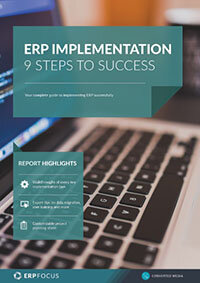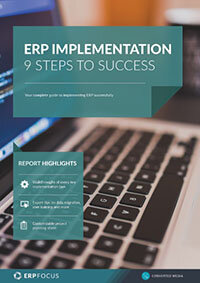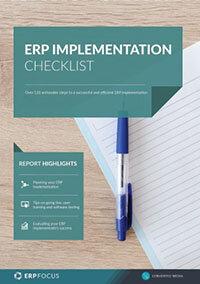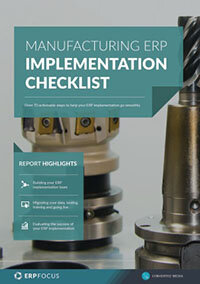Implementing ERP and setting expectations
ERP projects shouldn't fail. There is enough expertise out there, and enough free advice on websites such as this, to ensure success and indeed many ERP implementations are very successful. Still, we continue to hear that 70% or so of companies are at least disappointed with their systems.
Every time there is a high-profile failure, the debate on what caused it follows the usual pattern; with ineffective and incompetent consultants, lack of change management, and a lack of ownership regularly cropping up as suspects. But the words disappointment and failure can be very subjective, so perhaps there is something else going wrong, and understanding what that something else is will be a key to improving reported success and satisfaction rates.
This blog considers whether the problem is not actually with ERP itself but with setting expectations correctly. A company that expects too much of ERP will likely be disappointed but, equally, a company that doesn't expect enough is going to compare what it got against the cost of getting it and then conclude that it wasn't worth the effort.
Taking the problem of companies expecting too much from a new system; what could cause that to happen? Well, ironically, one problem lies in the fact that the people advocating a new system usually want the project to get the go-ahead because they genuinely believe that will make a real difference.
That can cause them to over-sell both ERP and the benefits that it is likely to bring. It is easy to do this because most ERP suppliers have 'case studies' on their websites and in their marketing material and these, of course, will detail improvements and achievements at their flagship sites and not their average or underperforming ones.
The senior management who signed off on the project will then be expecting spectacular results and when the new system actually delivers, for example, 'only' a 15% reduction in inventory levels, 'only' a 20% reduction in debtor days, and 'only' a 25% improvement in delivery performance, they may be disappointed and a system that would normally be lauded is instead considered to have failed to deliver what was promised.
Another problem with achieving expected results from a new system is that many systems sold as ERP are not ERP at all. Many are (very good) accounting systems and are perfectly capable of delivering what good accounting systems can deliver but, promises of 'improved management information' notwithstanding, these systems have none of the tools that proper ERP systems have to accomplish things like inventory level reduction and delivery performance improvement.
Yes; they can tell companies whether, for example, inventory levels are falling or rising but that is all they can do and that is not enough. Turning to set expectations too low; it might sound strange that companies with low expectations can be disappointed but the problem is actually that these companies can sometimes think that a series of small improvements are going to have a disproportionate effect.
Often they will approach ERP from a background of using accounting systems backed up by a mix of manual systems based on spreadsheets. When users in such companies are asked what they want, they typically reply, “Gives us what we already have but makes it faster, easier, and more robust”.
That leads them to try to computerize the status quo; believing that efficiency savings at a micro-level will have a macro effect. They won't; not least because approaching things from that angle makes it impossible to view the system as a whole, and strengthening individual links in a chain doesn't necessarily strengthen the chain itself.
So how can organizations identify realistic expectations? One very good source of information is their trading partners. Most companies have at least some customers and suppliers who are of similar size to them and at least some of those will have implemented ERP successfully.
These can not only be rich sources of information but are usually very happy to help because it is in the best interests of customers to have effective suppliers and it is in the best interests of suppliers to have successful customers.
It is important to realize that, at this stage, maximum benefit will be achieved not by asking for specific recommendations but by having conversations along the lines of, "What business problems did you introduce ERP to overcome?", and, "What would you do differently next time?".
(Note that this second question is worded in such a way that it doesn't ask them to admit to mistakes, but instead invites them to demonstrate how much they learned during the process.) When working with external consultants, it can be useful to ask if visits to some other companies that they have worked with on ERP implementation are possible.
If these companies are of similar size to yours, the visits can be very instructive (and, if they can't organize such visits, that can be very instructive also!). As with the reference site visits that are required after you select a preferred supplier, the best questions to ask are not normally those that can be answered with yes or no (note the two questions above).
A word of caution here, though. Not all companies have KPIs that can be used to calculate any improvements that followed an ERP implementation and, even when they do, these implementations can take a long time. During that time, they may well have been working on other initiatives to improve business performance, so it is often impossible to know exactly how much improvement was due to ERP and how much was due to those other projects and other factors.
There are many articles on this website that will be useful to companies at every stage of their ERP journey so checking back regularly to view new posts is always worthwhile.
Free white paper

ERP Implementation: 9 steps to success
The 9 proven steps you should follow when implementing ERP

Featured white papers
-

ERP Implementation: 9 steps to success
The 9 proven steps you should follow when implementing ERP
Download -

ERP Implementation Checklist
Over 120 actionable steps to implementing a new ERP successfully
Download -

Manufacturing ERP Implementation Checklist
Over 70 actionable steps to rolling out new manufacturing ERP software
Download
Related articles
-

ERP implementation plan (ERP implementation process guide)
Everything you need to know about running a successful ERP implementation - and we mean everything
-

How the right ERP can help you launch a successful omnichannel business
Petersen Zhu, CEO of DigitBridge and Vibes Base, shares how to create a scalable omnichannel stra...
-

The case for multi-tier ERP implementations
Learn more about multi-tier ERP implementation and why you might need one

